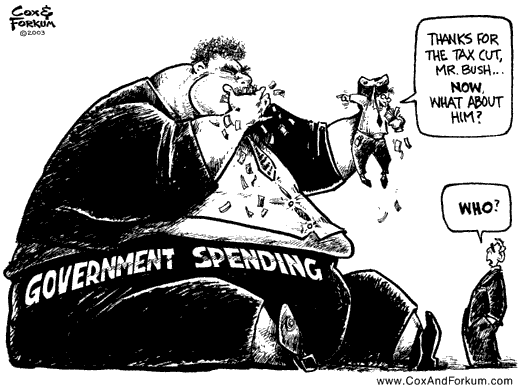In a recent column, I suggested that George W. Bush would likely win an overwhelming victory next year, given the weakness of the Democratic field. National Review’s Ramesh Ponnuru agrees, but he makes the important point that this prospect is not necessarily good for conservatives. The prescription drug subsidy bill before Congress is a good example of why this is the case.
The conventional wisdom among political professionals has long been that candidates run at their party’s base during primary season and toward the middle during the general election. This means that Democrats run to the left and then to the right. Republicans do the opposite, running first to the right and then pivoting leftward.
This is clearly what is going on in the Democratic Party, as the most leftward candidate, Howard Dean, has most of the momentum right now. This stands to reason since only the party’s most ideologically committed members are even paying attention to the candidates at this point. The danger for the Democratic Party is that John Kerry, Dick Gephardt and Joe Lieberman will divide up the mainstream vote, thereby making Dean a genuinely viable candidate for the nomination.
The result for Bush is that he could possibly win the biggest victory in history without having to work very hard for it. One would think that such a prospect would embolden him to stand firm on conservative principles. Since he doesn’t need to move to the left to win, he can afford to stay comfortably on the right.
The irony is that he is doing exactly the opposite. Because the Republican rank-and-file is so happy with Bush over his delivery of tax cuts and their desire to support him in the war or terror, he doesn’t need to move rightward to secure the base. This has allowed him to position himself for the general election — moving leftward, toward the center — at an early stage of the campaign.
The prescription drug subsidy bill is Bush’s signature issue in this triangulation maneuver. By supporting such legislation, he deprives Democrats of the one issue on which they might win next year. Unfortunately, Democrats like Ted Kennedy know how badly Bush wants a prescription drug bill and are driving a hard bargain. As with the 2001 education bill, Bush is effectively allowing Kennedy to dictate terms.
Conservatives in Congress are appalled by White House demands that they hold their noses and vote for the biggest expansion of government in 30 years. What is the point, they ask, of having control of the White House and Congress if it is just to enact Democrat big spending programs? Better to be back in the minority, many say.
As Ponnuru suggests, this is the price we are paying for being in the midst of a foreign policy crisis and having a Democratic Party controlled by its most extreme elements. The former tends to make conservatives reflexively support the president, while the latter makes the White House think that the middle of the political spectrum is there for the taking. With the elderly occupying much of that middle ground, the goal is simply to buy their votes with prescription drugs.
Richard Nixon did the same thing back in 1972, when he boosted Social Security benefits by 20 percent and automatically indexed them to inflation. But while this did buy the votes of the elderly that year, it did not buy their loyalty. When Nixon got into trouble over Watergate, the elderly did not come to his defense because of the windfall he showered on them. They simply took what he gave them for granted and asked, “What else are you going to do for me?”
Political analyst Charlie Cook suggests that something similar could happen to Bush. No matter how big a prescription drug subsidy is enacted into law, it will never meet the outsized expectations of today’s “Gimme Generation” of elderly, who feel they are owed unlimited benefits simply for living through World War II and the Great Depression. Therefore, they are guaranteed to be disappointed by the results and will chafe at any limitations on the government’s largess.
When Bush refuses to expand the program to their liking, Democrats will be more than happy to say they will. And should Republicans ever suggest anything in the future to restrain the inevitable growth of the prescription drug program, Democrats will predictably attack them for slashing it and killing untold numbers of seniors by denying them lifesaving drugs. These attacks will work, leaving Republicans as the bad guys once again, even though no prescription drug plan would exist without Republican support.
In short, the political calculation is penny-wise/pound-foolish in the extreme. Any prescription drug plan will be an albatross around the Republican Party’s neck for generations to come. It’s a bad deal.
***
From Cox and Forkum:











